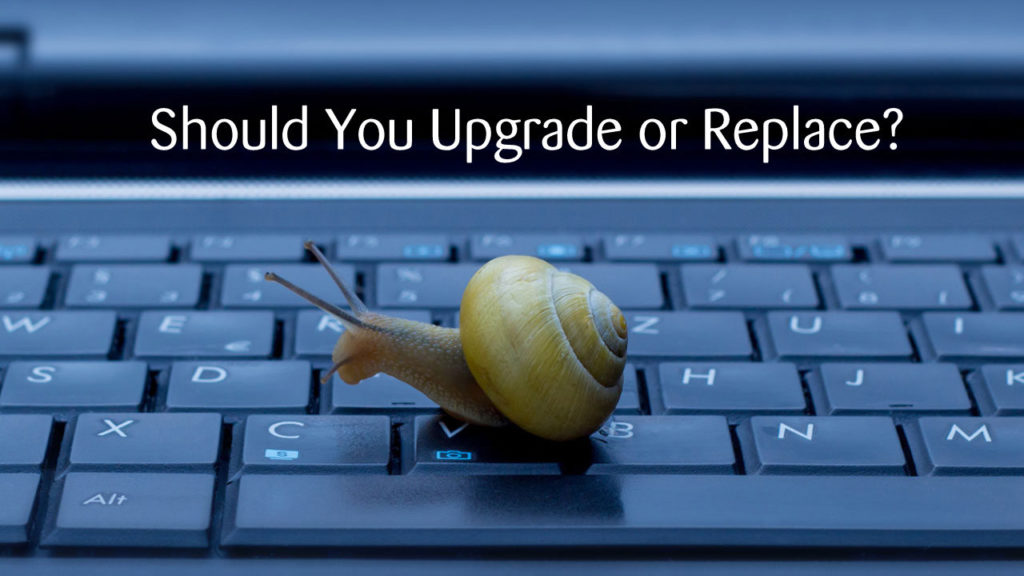
It seemed like just yesterday that your office had that “new computer smell” and your computer was fast, and everything ran smoothly. Now, just a few years later, it’s become sluggish and has a variety of little issues that have cropped up over the years.
Do you completely replace it or can you get away with upgrading it instead?
This is a question we help our clients answer often at Magnify247.com. As a leading provider of computer support, we help both residential and business clients get their systems in top running condition again. And, if it’s just not going to be cost effective to do an upgrade, we let them know when it’s time to replace an older system.
The average PC replacement cycle is 5 to 6 years.
According to the CEO of Intel, the average replacement cycle for computers is currently five to six years, which has increased from a 4-year average just a few years earlier. With mobile devices now being incorporated into the mix of our technology, desktops and laptops often are kept longer.
Upgrades such as replacing an old hard drive with a newer Solid-State Drive (SSD), adding memory, or upgrading a graphics card can all help older computers get faster and handle the demands of newer software and operating systems.
In many cases upgrading before completely replacing can be cost-effective and help you get more life out of a computer. But, there does come a point where upgrading is no longer cost or time-efficient.
We are pleased to be a trusted resource for computer support. Our customers know that we are always going to give it to them straight about a system upgrade or replacement and which one would make the most sense for them.
We’ve put together a few tips below on how you know whether you can upgrade an older computer or when it’s time to completely replace it.
How to Know Whether You Should Upgrade or Replace an Old Computer
While 5-6 years may be the average replacement time for a computer, many people keep them longer if they can. If you’re a company with multiple computers, you have to weigh the costs of replacement against trying to get more miles from a current device.
Certain computers like large iMacs can cost quite a bit, so they’re not as easily replaced due to the cost, and owners would rather try to upgrade parts than replace the whole thing.
A few considerations go into deciding to replace or upgrade, such as:
- Computer cost
- How old it is
- Whether it’s been upgraded already
- If it will still support new operating system updates & security patches
- The cost of the upgrades versus a new computer
When it comes to cost, usually upgrading will cost you less than buying a new system. Plus, when you buy a new computer, you need to have all your programs and files transferred onto it, which can be a hassle, unless you work with someone like Magnify247.com to do it for you.
But, there comes a time in every computer’s life when it’s just not cost-effective anymore to try to upgrade the memory, hard drive, or other parts due to the age and limitations.
When to Upgrade a Computer
- When you can install more RAM (Random-access memory)
- If you can replace an older hard drive with a faster SSD
- If after upgrading, the computer will still support operating system updates
- If upgrading will cost less than replacement
- When you need a quick, affordable fix for a sluggish computer
Upgrading a computer can give it new life and several more years of service if it’s done right. Before you decide to just go out and buy more RAM, you may want to have a computer expert look at your system to give you advice on the upgrades that will give you the best bang for your buck.
For example, if you’re a gamer or use graphics-heavy programs in your work, then upgrading your graphics card can make a huge difference and improve performance. But if you have an All-In-One machine, like an iMac, that has an integrated graphics card, that might mean replacing the entire motherboard, which can be more expensive.
An IT expert is going to be able to tell you what type of performance you can expect from upgrades and what they’ll cost, so you can judge whether it makes sense before you begin buying parts.
When to Replace a Computer
- Your computer has already been upgraded in the past
- The system can’t have its memory or hard drive upgraded
- The computer can’t support the most current operating system
- The upgrade will cost more than a new computer
- You’ll looking for a big boost in performance, space, and other features
While buying a whole new system may seem daunting, if your computer doesn’t have the ability to add much more as far as storage or performance, then you may end up being happier and more productive with a new system.
If you’re looking at replacing more than one computer in an office, you may find that you can take advantage of some volume discounts, thus easing the cost burden a bit. You can also look into refurbished computers, which can give you the best of both worlds, a new, faster system at a lower cost.
We’d recommend you consult an IT expert before you make a new computer purchase, so you can be sure you’re getting a system that will last as long as possible and give you room to grow in the future.
Need Some Help with an Older Computer?
We’re happy to look at an older system and let you know whether upgrading or replacement is your best move.






